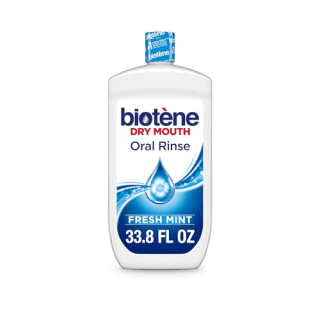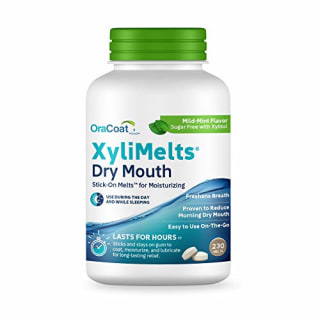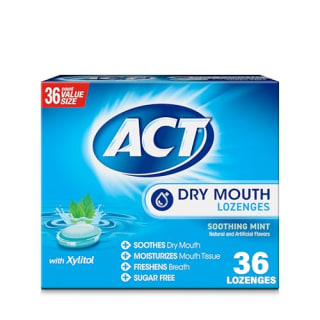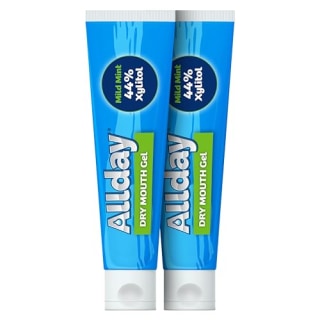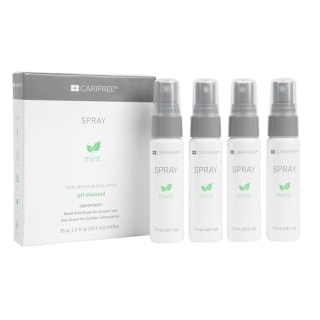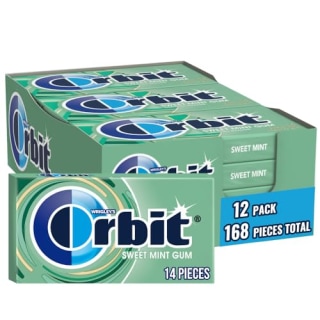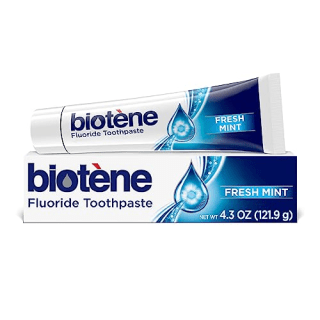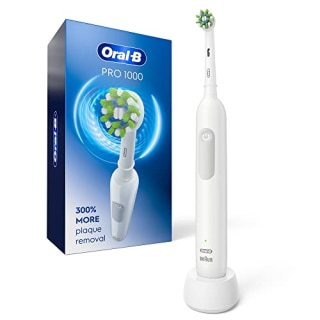Do you wake up in the middle of the night and need to drink water? Or notice that your mouth constantly feels like it’s filled with cotton balls? You might have dry mouth (a.k.a. xerostomia), an oral health condition that causes reduced saliva flow, leading to symptoms like a burning sensation, rapid tooth decay, uncontrolled cavities, bad breath, altered taste and more.
Dry mouth is quite common — it affects about one in five people, according to the Cleveland Clinic. But it’s under-diagnosed because often, people who experience it mistakenly think they’re dehydrated, says Dr. Kourosh Maddahi, a dentist at Dion Health in California and the founder and CEO of Lumineux. And the longer you go without treating dry mouth, the more long-term damage it can do to your oral health.
To help you determine if you have dry mouth, and figure out how to alleviate symptoms, I talked to dentists about everything you need to know. I also rounded up the best over-the-counter dry mouth treatments, one of which you might have in your bag right now.
Want more from NBC Select? Sign up for our newsletter, The Selection, and shop smarter.
What is dry mouth?
Dry mouth is a condition that makes your mouth feel dry due to inadequate saliva flow, says Dr. Matthew Messina, an associate professor at The Ohio State University College of Dentistry and the clinic director of Ohio State’s Upper Arlington Dentistry. It can be caused by medications, mouth breathing, radiation treatment and tobacco and cannabis use, for example.
To fully understand why dry mouth can be so damaging to your oral health, it’s important to understand the important roles saliva plays in the mouth. As a natural antibiotic, it’s the mouth’s first line of defense against cavity-causing bacteria, and it also acts as a lubricant to prevent abrasion, and cleans plaque and other particles off teeth, says Dr. Patrick Lloyd, the dean of the Stony Brook University School of Dental Medicine. Saliva also remineralizes tooth enamel (teeth’s hard outer layer) since it has calcium and phosphate, which make teeth more resistant to decay. Another crucial function of saliva is to neutralize acids, says Lloyd. When the bacteria in your mouth break down sugars, they produce acids that can weaken enamel. Saliva neutralizes these acids to prevent them from damaging your teeth, and helps your mouth maintain a balanced pH.
All that said, if dry mouth isn’t managed and you constantly don’t have enough saliva in your mouth, it can lead to rampant cavities, bad breath, difficulty swallowing, mouth sores, poor taste and more.
How do you treat dry mouth?
If you’re concerned about dry mouth, first see your dentist. They’ll examine your mouth, looking for the appropriate amount and consistency of saliva, as well as signs of decay, says Messina. Then, they’ll help you develop a treatment plan, which often consists of using over-the-counter products to alleviate symptoms, like mouthwashes, gels, chewing gums and lozenges. While these products temporarily relieve symptoms associated with dry mouth, they have limitations. They don’t address the underlying cause of the condition, completely prevent issues like tooth decay, and also not long-term solutions.
Treating dry mouth also involves making lifestyle changes, like cutting back on certain food and drinks (more on that in the FAQs section below). If you have severe dry mouth that will likely cause recurring dental issues, your dentist may prescribe a concentrated fluoride gel or toothpaste, which helps make teeth more resistant to decay.
How I picked the best dry mouth treatments
Here’s what dentists recommend I consider while shopping for dry mouth treatments.
- Saliva substitute v.s. stimulant: Saliva substitutes act as a moisturizer for your mouth, alleviating the dry, sticky, burning sensation that’s typically associated with the condition. They’re not as effective as natural human saliva, but they work well enough, dentists told me. Saliva stimulants, on the other hand, activate the taste buds, sending a signal to the brain that it needs to tell the salivary glands to make more saliva, says Lloyd. Many treatments are both saliva substitutes and stimulants, while some are one or the other — I have all types on this list.
- Type: Dry mouth treatments are available as mouthwashes, sprays, dissolvable tablets, gels, chewing gums and more. One is not better than the other — it’s entirely a matter of personal preference, so try a few and see what works for you. Some treatments also lend themselves better to at-home use versus on the go use, and vice versa. I recommend various treatment types below so you can compare them and decide which you might like best.
- Ingredients: Avoid products made with alcohol and sugar if you have dry mouth as they can worsen the condition. For example, choose alcohol-free mouthwashes and sugar-free gum and lozenges. Over-the-counter dry mouth treatments are commonly made with xylitol, a sugar substitute that the mouth bacteria doesn’t feed on, so it doesn’t cause cavities while stimulating saliva production, says Messina. All the products on this list are sugar-free and alcohol-free, and many are made with xylitol.
- ADA Seal of Acceptance: Dental products that earn the American Dental Association’s Seal of Acceptance are independently evaluated by the organization to ensure they’re safe and effective, says Messina. That doesn’t mean products without the Seal aren’t worth using — it just means brands haven’t voluntarily submitted them to be reviewed. I prioritized ADA-accepted products while recommending the dry mouth treatments below, but the options are limited.
The best dry mouth treatments of 2025
Below, I rounded up dry mouth treatments that are available over the counter that meet dentists’ guidance.
Best mouthwash
Instead of drinking water when your mouth feels dry, use a hydrating mouthrinse, says Maddahi. Bioténe’s, which earned the ADA’s Seal of Acceptance, stops dry mouth symptoms for up to four hours by soothing, lubricating and moisturizing. It also can help stimulate saliva production since it’s made with xylitol. The mouthwash’s minty flavor freshens breath, and it helps your mouth maintain a balanced pH, too — the mouth’s pH becomes more acidic due to a lack of saliva, which neutralizes acids, according to the dentists I talked to. The brand recommends swishing it around in your mouth for about 30 seconds before spitting it out, and says you can use it up to five times a day.
Best dissolvable tablets
These dissolvable tablets can relieve dry mouth symptoms for up to eight hours, according to the brand. You place a tablet on one or both sides of the mouth outside of a molar, putting the tan side against your gum and the white side against your teeth. Move it into a comfortable spot with your tongue, and then don’t touch it — it will start to adhere to your gums so it stays in place. The tablet slowly releases xylitol to lubricate the mouth and stimulate saliva production throughout the day, or you can apply it for overnight relief. XyliMelts are also made with calcium carbonate, an ingredient that helps prevent plaque and tooth decay, according to the brand. They can neutralize acids, too, preventing tooth damage like weakened enamel. The tablets come in three flavors: cinnamon, mild mint and slightly sweet.
Best lozenges
If the tablets above sound like a hassle to apply, or you don’t love the idea of them staying in your mouth for hours, lozenges for dry mouth are another option you can try. Act’s lozenges slowly dissolve in your mouth like cough drops, and they’re made with xylitol to stimulate saliva production, as well as glycerin to moisturize and soothe tissue. The lozenges, which are available in mint and lemon flavors, freshen breath, too.
Best gel
This thick gel is highly concentrated with 44% xylitol, so the brand says its best for those with severe dry mouth or overnight use. You squeeze a half-inch strip on your tongue and spread it around your mouth, letting its ingredients, including glycerin, moisturize and soothe oral tissues. The gel’s mint flavor also freshens breath, and it helps the mouth maintain a neutral pH.
Oral sprays are a lubricant that usually feel like an oil, and a few spritzes almost immediately relieve the feeling of dry mouth, says Lloyd. CariFree’s Oral Spray comes highly recommended by NBC Select editorial operations associate Jem Alabi. She gets “a very serious case of dry mouth” from certain foods and drinks, and says this spray is her go-to solution. “It freshens my breath in a way that lasts for hours, and I love that it comes in a pack of four so I can keep one at work, home and in my travel backpack,” says Alabi. “The mint flavor is mild and doesn’t sting like some others can, but it also comes in a grape flavor if you want to switch it up.” The spray’s gentle formula, which contains xylitol, helps neutralize acids in your mouth to balance its pH as well, and it’s safe if you swallow it, according to the brand.
Best gum
Chewing naturally causes saliva production, so you can use sugar-free gum as a saliva stimulant, says Lloyd. There’s options specifically made for dry mouth (like this one from Act), but any sugar-free option will do. “You don’t have to look for a really expensive way to manage dry mouth,” says Lloyd. “Whatever you can do to hyper-stimulate your salivary gland and tastebuds to produce saliva in healthy situations is beneficial.”
Orbit’s ADA-accepted, sugar-free gum is my all-time favorite option. It’s available in five flavors: sweet mint, bubblemint, spearmint, peppermint and wintermint. Each resealable pack comes with 14 pieces.
Best toothpaste
“Brushing your teeth gently at least twice a day with a fluoridated toothpaste may help provide relief from or prevent adverse consequences of dry mouth,” says Messina. Some toothpastes are specifically formulated for those with dry mouth, including this one from Bioténe. It won’t irritate your mouth or worsen symptoms, according to the brand, and it has a mild minty flavor to help freshen breath. The toothpaste’s fluoride fights cavities, remineralizes tooth enamel to strengthen it, making it more resistant to decay, and reduces bacteria in the mouth, plus it’s free from sodium lauryl sulfate (SLS), a detergent that makes toothpaste foamy, yet some people are sensitive to.
Best electric toothbrush
Consider getting an oscillating electric toothbrush if you have dry mouth, which cleans teeth more deeply than a manual toothbrush, says Lloyd. It removes built-up grime that the little saliva in your mouth couldn’t wash away, and dislodges gunk between teeth. “The oscillating bristle tips not only remove debris that they come in contact with, but their vibrating effects move beyond the bristles and can cause things to be removed from teeth two or three millimeters away from their ends,” he says.
Oral-B’s Pro 1000 Electric Toothbrush has all the features dentists recommend looking for in a quality toothbrush: the ADA Seal of Acceptance, a two-minute timer, a pressure sensor and a small round head to reach all of your mouth’s nooks and crannies. The brush head is also easily replaceable — dentists recommend swapping it out every three months and after you’re sick. Oral-B’s electric toothbrush lets you choose between three cleaning modes, and it comes with a charger stand. The battery lasts for about 10 days when fully charged, according to the brand.
Meet our experts
At NBC Select, we work with experts who have specialized knowledge and authority based on relevant training and/or experience. We also ensure that all expert advice and recommendations are made independently and with no undisclosed financial conflicts of interest.
- Dr. Patrick Lloyd is the dean of the Stony Brook University School of Dental Medicine.
- Dr. Kourosh Maddahi is a dentist at Dion Health in California, and the founder and CEO of Lumineux.
- Dr. Matthew Messina is an associate professor at The Ohio State University College of Dentistry and the clinic director of Ohio State’s Upper Arlington Dentistry.
Why trust NBC Select?
I’m a reporter at NBC Select who has been covering dental care and oral health for over five years. I’ve written articles about numerous types of toothpaste, teeth whitening treatments, whitening strips, mouthwash, floss, water flossers and more. I’ve interviewed dozens of dentists throughout my career, and constantly test dental care products to learn what’s new on the market. To write this article, I talked to three dentists about dry mouth and rounded up over the counter treatments that align with their guidance.
Catch up on NBC Select’s in-depth coverage of tech and tools, wellness and more, and follow us on Facebook, Instagram, Twitter and TikTok to stay up to date.
